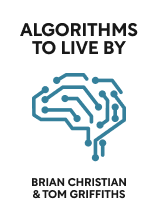

This article is an excerpt from the Shortform book guide to "Algorithms to Live By" by Brian Christian and Tom Griffiths. Shortform has the world's best summaries and analyses of books you should be reading.
Like this article? Sign up for a free trial here .
Are you looking for Algorithms to Live By quotes by Brian Christian and Tom Griffiths? What are some of the most noteworthy passages worth revisiting?
In Algorithms to Live By, bestselling author Brian Christian and cognitive scientist Tom Griffiths team up to create a library of “algorithms to live by”—a set of instructions to help you make smarter decisions, organize your life, and get the most out of your day.
Here is a selection of quotes highlighting some of the key themes explored in the book.
Algorithms to Live By: The Computer Science of Human Decisions
Humans and computers face many of the same problems: We both have a never-ending stream of things we want to do and a limited amount of time and energy to do them. Is it possible that the age-old question of how best to live has already been solved by computer engineers? In Algorithms to Live By, science writer Brian Christian and Berkeley psychologist Tom Griffiths team up to prove that computer science is a fount of unconventional wisdom with practical value in many areas of human life.
The following Algorithms to Live By quotes highlight some of their key ideas:
“Don’t always consider all your options. Don’t necessarily go for the outcome that seems best every time. Make a mess on occasion. Travel light. Let things wait. Trust your instincts and don’t think too long. Relax. Toss a coin. Forgive, but don’t forget. To thine own self be true.”
To move past dead ends, sometimes it makes sense to appeal to chance. Just like a traveler who points to a globe to decide where to live, computers act randomly when they don’t know what else to do. Such behavior seems like an irrational human quirk, but pure randomness has several unexpected uses.
A sufficient amount of randomness in your real-life problem-solving can lead you down paths you would have never chosen, some of which lead to greater success. In our dead-end job example, a random change, whether it be a new job or a new home, would force you out of your comfortable but unfulfilling local maximum and give you a chance to find a better “new normal.” Your living conditions may become temporarily worse, but unforeseen new opportunities to improve your life will hopefully leave you better off in the long run.
“Some of the biggest challenges faced by computers and human minds alike: how to manage finite space, finite time, limited attention, unknown unknowns, incomplete information, and an unforeseeable future; how to do so with grace and confidence; and how to do so in a community with others who are all simultaneously trying to do the same.”
The authors assert that this is true because humans and computers face very similar problems. Both humans and computers are motivated to use their limited resources (which include memory, attention, and time) as optimally as possible. Consequently, many of the algorithms, or sets of instructions, that computers use to solve their problems work just as well in our own lives.
“The greater the uncertainty, the bigger the gap between what you can measure and what matters, the more you should watch out for overfitting – that is, the more you should prefer simplicity”
In statistics and machine learning, “overfitting” occurs when a model takes too many variables into account, resulting in faulty understanding. Christian and Griffiths argue that, in the same way, if you consider too many variables when making a decision, you’ll “overfit,” overestimating the impact of insignificant information and underestimating the details that really matter. According to Christian and Griffiths, the trick to conquering overfitting is to consciously restrict the amount of information you consider when making decisions. Identify one or two factors that matter the most and ignore everything else. For example, you may decide what job to take solely based on how much you expect to enjoy the work.

———End of Preview———
Like what you just read? Read the rest of the world's best book summary and analysis of Brian Christian and Tom Griffiths's "Algorithms to Live By" at Shortform .
Here's what you'll find in our full Algorithms to Live By summary :
- How to schedule your to-do list like a computer
- Why making random decisions is sometimes the smartest thing to do
- Why you should reject the first 37% of positions in your job search






